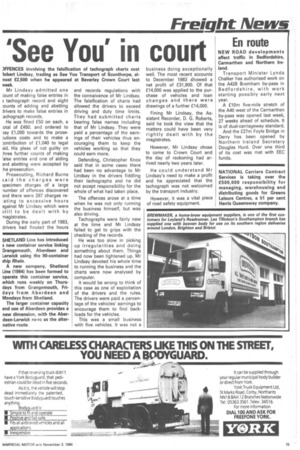'See You' in court En route
Page 17

If you've noticed an error in this article please click here to report it so we can fix it.
NEW ROAD developments affect traffic in Bedfordshire, )FFENCES involving the falsification of tachograph charts cost lobert Lindsay, trading as See You Transport of Scunthorpe, alnost £2,500 when he appeared at Beverley Crown Court last week.
Mr Lindsay admitted one .:ount of making false entries in a tachograph record and eight ;ounts of adding and abetting drivers to make false entries in :achograph records.
He was fined £50 on each, a :otal of £450, and ordered to my £1,000 towards the prose...'utions costs and to make a '...ontribution of £1,040 to legal aid. His pleas of not guilty on :hree further counts of making 'else entries and one of aiding and abetting were accepted by :he prosecution.
Prosecuting, Richard Burns ;aid the charges were 3pecimen charges of a large lumber of offences discovered and there were 287 charges reeling to excessive hours against Mr Lindsay which were ;till to be dealt with by magistrates.
During the early part of 1983, drivers had flouted the hours and records regulations with the connaivance of Mr Lindsay. The falsification of charts had allowed the drivers to exceed driving and duty time limits. They had submitted charts bearing false names including that of Mr Lindsay. They were paid a percentage of the earnings of their vehicles thus encouraging them to keep the vehicles working so that they could earn more.
Defending, Christopher Knox said that in some cases there had been no advantage to Mr Lindsay in the drivers fiddling their tachographs and he did not accept responsibility for the whole of what had taken place.
The offences arose at a time when he was not only running the business himself, but was also driving.
Tachographs were fairly new at the time and Mr Lindsay failed to get to grips with the checking of the records.
He was too slow in picking up irregularities and doing something about them. Things had now been tightened up. Mr Lindsay devoted his whole time to running the business and the charts were now analysed by computer.
It would be wrong to think of this case as one of exploitation of the drivers and the rules. The drivers were paid a percentage of the vehicles' earnings to encourage them to find backloads for the vehicles.
This was a small business with five vehicles. It was not a business doing exceptionally well. The most recent accounts to December 1983 howed a net profit of £31,900. Of that £14,000 was applied to the purchase of vehicles and loan changes and there were drawings of a further £14,000.
Fining Mr Lindsay, the Assistant Recorder, D. G. Roberts, said he took the view that the matters could have been very rightly dealt with by the magistrates.
However, Mr Lindsay chose to come to Crown Court and the day of reckoning had arrived nearly two years later.
He could understand Mr Lindsay's need to make a profit and he appreciated that the tachograph was not welcomed by the transport industry.
However, it was a vital piece of road safety equipment.








































































































